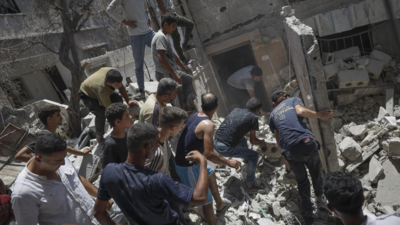- News
- World News
- Middle East News
- Israel's top court rules for mandatory military service for ultra-Orthodox Jewish men
Trending
Israel's top court rules for mandatory military service for ultra-Orthodox Jewish men

Palestinians search for bodies and survivors in the rubble of a residential building destroyed in an Israeli airstrike in Khan Younis, southern Gaza Strip, Tuesday, June 25, 2024. (AP)
In a unanimous decision on Tuesday, Israel's High Court of Justice ruled that the state must draft ultra-Orthodox Jewish men into military service, a move that could potentially destabilize Prime Minister Benjamin Netanyahu's ruling coalition.
The court's decision comes at a time when calls are growing for ultra-Orthodox men, who have historically been exempt from mandatory service, to enlist as Israel engages in war with Hamas in Gaza and prepares for potential fighting in Lebanon.
The court stated, "The executive branch has no authority to order not to enforce the Security Service Law for yeshiva students in the absence of an appropriate legislative framework". The justices ruled that without a law granting exemptions to students at Jewish seminaries, "the state must act to enforce the law".
Additionally, the court ordered the state to stop funding yeshivas whose students evade military service. The ruling was in response to petitions from civil society groups advocating for mandatory military service for ultra-Orthodox men.
The ultra-Orthodox community, represented in Netanyahu's government, has historically received exemptions for men to study in religious seminaries, which are viewed as crucial to preserving Israel's Jewish identity. The lack of legislative regulation for these exemptions has been a source of political tension in Israel for decades, and the issue of ultra-Orthodox enlistment led to the collapse of a previous Netanyahu-led coalition government in 2018, sparking years of political deadlock.
Since October 7, hundreds of thousands of Israeli reservists have been deployed to Gaza, the occupied West Bank, and along the northern border with Lebanon. Netanyahu's coalition government is comprised of two ultra-Orthodox parties vehemently opposed to a military draft for yeshiva students, along with religious ultranationalist factions, making the court's ruling a potential threat to the stability of his government.
Likud, Netanyahu's party, proposed a bill this month aimed at setting benchmarks for increasing ultra-Orthodox enlistment to resolve the draft issue. "It's surprising the High Court of Justice, which has avoided forcing the enlistment of yeshiva students with a decision for 76 years, does it especially now, on the eve of completing the historic draft bill," the party said in a statement.
However, critics argue that the bill falls short of the military's personnel needs since October 7, and some members of Netanyahu's party have stated they will vote against the draft bill in its current form.
The court's decision comes at a time when calls are growing for ultra-Orthodox men, who have historically been exempt from mandatory service, to enlist as Israel engages in war with Hamas in Gaza and prepares for potential fighting in Lebanon.
The court stated, "The executive branch has no authority to order not to enforce the Security Service Law for yeshiva students in the absence of an appropriate legislative framework". The justices ruled that without a law granting exemptions to students at Jewish seminaries, "the state must act to enforce the law".
Additionally, the court ordered the state to stop funding yeshivas whose students evade military service. The ruling was in response to petitions from civil society groups advocating for mandatory military service for ultra-Orthodox men.
Ultra-Orthodox Jews, who adhere to a strict interpretation of Jewish custom and largely live in insular communities in Israel and elsewhere, make up about 13 percent of Israel's nearly 10 million population. In Israel, military service is mandatory for Jewish men, while religious women are exempt.
The ultra-Orthodox community, represented in Netanyahu's government, has historically received exemptions for men to study in religious seminaries, which are viewed as crucial to preserving Israel's Jewish identity. The lack of legislative regulation for these exemptions has been a source of political tension in Israel for decades, and the issue of ultra-Orthodox enlistment led to the collapse of a previous Netanyahu-led coalition government in 2018, sparking years of political deadlock.
Since October 7, hundreds of thousands of Israeli reservists have been deployed to Gaza, the occupied West Bank, and along the northern border with Lebanon. Netanyahu's coalition government is comprised of two ultra-Orthodox parties vehemently opposed to a military draft for yeshiva students, along with religious ultranationalist factions, making the court's ruling a potential threat to the stability of his government.
Likud, Netanyahu's party, proposed a bill this month aimed at setting benchmarks for increasing ultra-Orthodox enlistment to resolve the draft issue. "It's surprising the High Court of Justice, which has avoided forcing the enlistment of yeshiva students with a decision for 76 years, does it especially now, on the eve of completing the historic draft bill," the party said in a statement.
However, critics argue that the bill falls short of the military's personnel needs since October 7, and some members of Netanyahu's party have stated they will vote against the draft bill in its current form.
End of Article
FOLLOW US ON SOCIAL MEDIA











